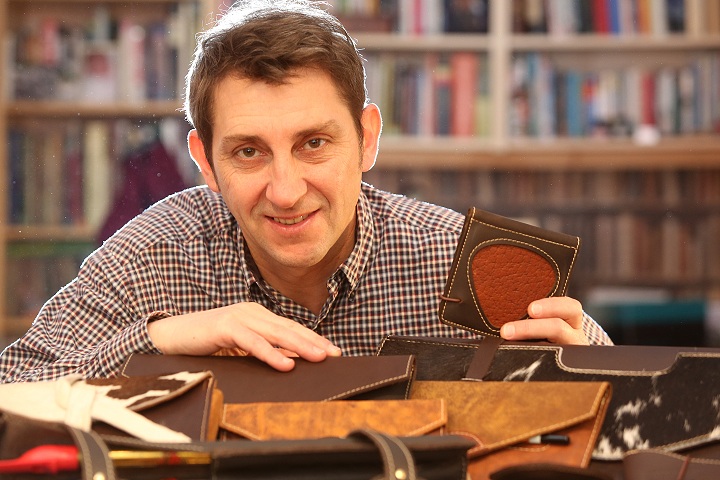How starting your own business can give you a new lease of life
For people of all ages self-employment can be the key to a new lease of life. Here, two entrepreneurs who launched their own businesses after leaving work explain how they achieved both success and satisfaction.
Ian MacQueen
After a successful career, Ian found he wanted something more from retirement. He started Big Fire, a business that sells wood-fired products such as stoves and hot tubs. This is his story.
What motivated you to start a business?
After retiring from mainstream corporate life I found that I missed the challenge of business life and decided to start my own retail and distribution business. My career had been spent exclusively in the retail industry with my last appointment as group managing director for Fiskars Brands UK with responsibility for Wilkinson Sword, Sankey Water Butts and Propagators, Kitchen Devils and Fiskars Orange handled Scissors. Motivation has been very simple as the challenge and excitement of creating something new is always absorbing.
How did you go about building a network to help promote your business and find customers?
I established a website, Bigfire.co.uk, and then populated it gradually with a product range that represented a particular sector, which in this case is outdoor and indoor fire products with certain exceptions. I also secured the UK distribution rights for some of the products and then appointed a network of dealers to sell the products throughout the UK. Those dealers work on commission and allow the company to reach a wider customer base. I also used PR to get media coverage and spread the word, as well as exhibiting at trade and retail shows such as Grand Designs Live, The Ideal Home Show and Solex Trade Show. The products have also been featured on the Channel 5 Gadget Show and Kevin McCloud’s Grand Design TV Show. By continually exposing the product range to as many relevant outlets and customers as possible the acceptance of the range grew until a tipping point was reached. You just have to keep going.
How did you balance other aspects of your life with launching a business?
I remained firmly resolute that my family life came first and the business second and in that way there was never an issue. You need to believe in your idea and make sure that you have fully thought through all the implications of what you have decided both in terms of financial and family commitments as far as is possible and then stick with it and keep going unless and until your original plan is proven or you need to change course in light of results.
What lessons have you learned from the overall process? What would you do differently if you were to do it again?
As ever most things take longer than you anticipate. Always ensure that whatever decision you make does not have the ability to financially bring the business down. Also, you must believe in what you do and not just take somebody else’s viewpoint. If I was to do it again, I’d appoint dealers more quickly to accelerate sales.
What resources (books, blogs, tools etc) and sources of advice would you recommend to those looking to start or who have just started a business?
Simply interrogate the internet with the questions you want answered. Also, those who lack experience should find a mentor from somewhere like the Prince’s Initiative for Mature Enterprise (Prime).
You can find Big Fire on Twitter and Facebook.
Rod Boyes
Following redundancy, Rod launched his own business, Pinegrove Leather, making hand-crafted leather products and now sells internationally. Here’s his story.
What motivated you to start a business?
After being made redundant I decided to take the opportunity to try something completely different. I wanted to do something where I wasn’t looking at a computer screen all the time as I was in my previous work. In Pinegrove Leather, my time is split between the computer and the workbench, which is much better. The very positive customer feedback I get on Pinegroveleather.co.uk is a major motivator. My wife and friends also help me to keep motivated.
How did you go about building a network to help promote your business and find customers?
I have created a Facebook page for Pinegrove to which I invited all my Facebook friends. It now has over 300 likes from real people. I recently created a Twitter account for Pinegrove which now has over 700 real followers. I have placed my products in some craft shops, principally to gain visibility. I have also hired a stand at some craft fairs and festivals for the same reason. Connecting with the right people is difficult. I am currently focusing on cases for harmonicas, so I am advertising in harmonica magazines and attending harmonica-interest events with a display stand.
How did you balance other aspects of your life with launching a business?
I have to tell myself to down tools at 8pm, but it doesn’t always work! I guess it’s good to be enthusiastic about your business, and new businesses need a lot of work. I’m in a band so that gets me out of the house and doing something different. A hobby where other people are dependent on you is the thing I guess, as that makes you go and do it. For example, if you like keeping fit, play a team sport.
What lessons have you learned from the overall process? What would you do differently if you were to do it again?
Just telling people about the great things you make or do (basic marketing) will take far more time than you think. When planning your business, the most important thing is the profit and loss forecast, and making sure you have included all your overheads. This can be difficult to predict, so be prepared to frequently revise it as you go along. This is what I would do differently if I started again!
What resources (books, blogs, tools etc) and sources of advice would you recommend to those looking to start or who have just started a business?
A start-your-own-business course gives a good grounding. I took a course offered by Prime. I also took an Open University management course back in 2004, although something that in-depth isn’t needed to start a business. A mentor is worth trying, but they tend to avoid the numbers like the plague, even those who have come from a financial background. If you provide a service or goods for which your customer pays later (ie: you give credit) then get a book on how to get paid. Get it now, as success is dependent on preparing for bad payers right from the start. I’ve had a copy of How to Collect the Money You are Owed for 20 years now, and it has worked for me. Other people will probably want to track down something more up to date. Finally, if you are new to marketing, get a book on that to learn some basic tricks. I would suggest people browse the shelves of their nearest Waterstones. Look for a book that is written for your type of business, whether you sell real products or provide a service.
Thanks to Steven Fifer at Prime for his help in putting this article together. Prime helps over 50s who are out of work start their own business and was founded by HRH The Prince of Wales.

